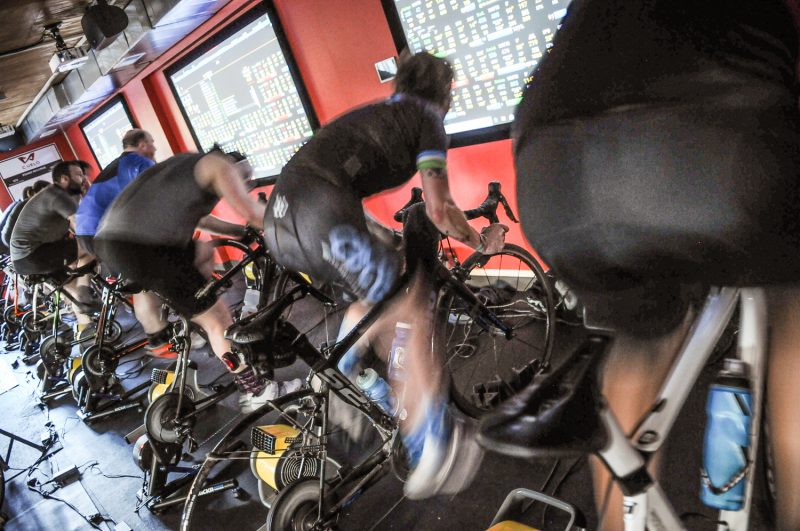
(Photo: J. Maus)
Some of Portland’s toughest bike races don’t even happen on the road.
Over the past seven years, exercise physiologist Rick Cady has melded his love of cycling with the science of human performance to create an indoor training center unlike anything in Oregon.
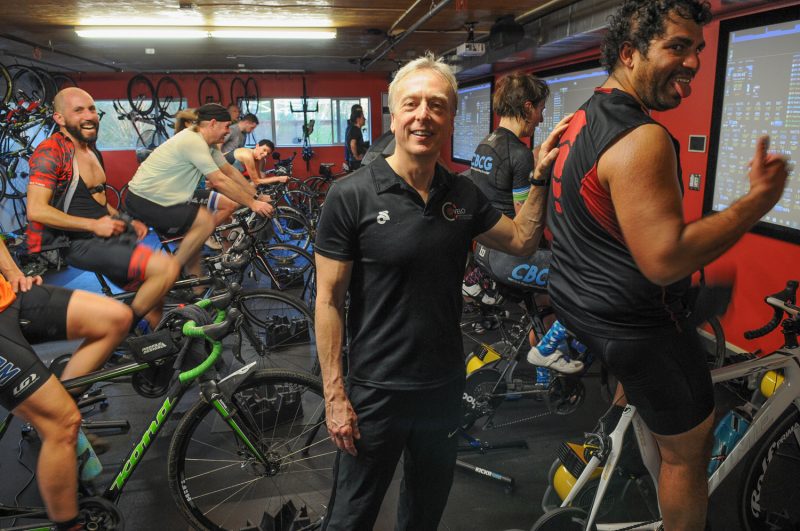
At Cady’s C-Velo Performance Cycling Training Center in Sellwood, customers attach their bikes (sans rear wheel) to “smart” trainers and compete against a bevy a data that tells them how hard they’re working as they pedal.
I showed up last week to watch them “race”.
As riders filtered in it was clear camaraderie is a big part of what makes Cady’s business tick. It was like the old TV show Cheers as people reacted to old friends and settled into their places at the bar. “There’s always energy in a group environment,” Cady said to me as he set up his software program and told riders which of the 15 trainers to sit on.
“I’m trying to fill the niche of what Spin studios don’t cater to,” he continued. “Those places cater to the general person who wants a workout where they can sweat on a bike. I’m working with athletes who want to have their off-season actually mean something.”
For riders like Mielle Blomberg, whose husband Shane also did the race, one appeal of this Wednesday night class is a social one. “I show up because I want to hang with this group,” she said. “I feed off the energy.”

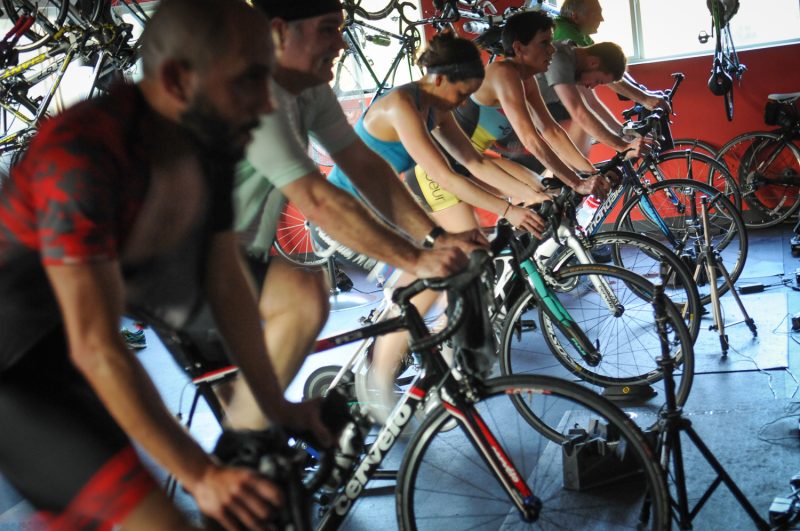
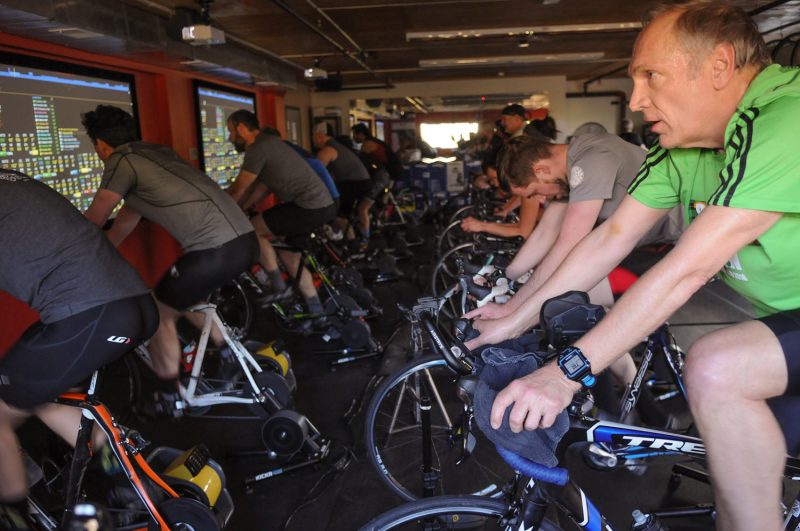
Advertisement
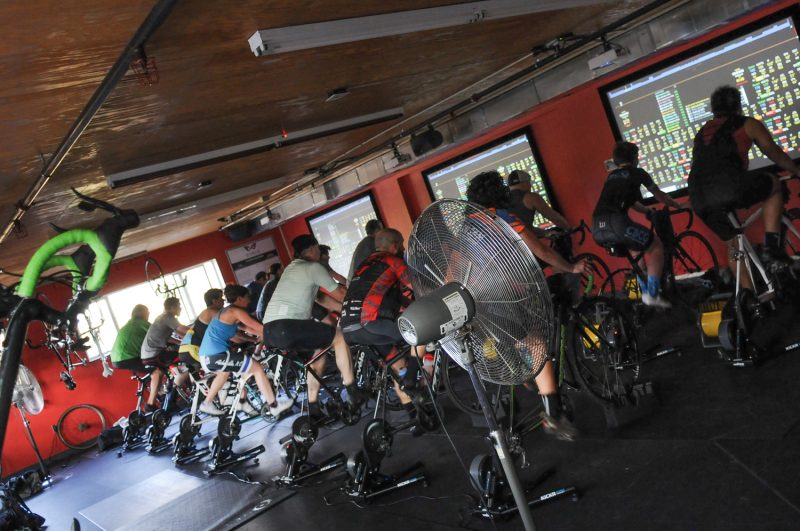
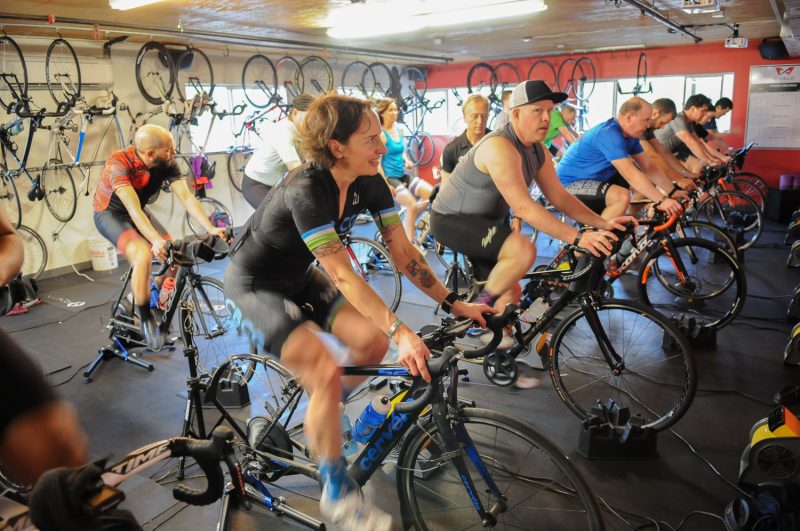

Indoor training has gone through many tech revolutions since Cady first opened his doors in 2011. Back then he set up resistance trainers (devices that hook onto a rear wheel of a bicycle and allow you to pedal in place) that had a very basic console for vital data. “It was like a Spin class, but power-based,” he recalled. In the bike training world, a rider’s power output is a standard metric used as the basis for workouts. Once your functional threshold power (FTP, the amount of watts you can sustain for an hour) is set, a coach like Cady can customize a training plan that will make you stronger and faster.
“We suffer together. It’s a community.”
— Saachi Murthy
In the past few years, trainers have gotten “smart” — and they’ve been connected to the Internet via subscription services like Zwift. With a Bluetooth-enabled smart trainer and a Zwift account, a rider can watch themselves compete for points, prizes, and personal records on a computer screen alongside thousands of people from around the world who are using it at the same time. The trainers mimic the contours of the road, getting harder to pedal on a climb and easing up on downhills.
Cady uses similar technology for his classes. During a typical workout, the trainers automatically adjust resistance. “They don’t have to think,” Cady said of his clients. “They can just come in, set up, and follow what we tell them to do.”
The 15 people who showed to Cady’s one-hour session on Wednesday are doing an 8-week course aimed at building power. Cady uses a customized version of PerfPRO, software that connects to each rider’s trainer and calculates a dizzying amount of data. The software can derive how much power each person creates, how fast they’re pedaling, the distance they’re going, and so on. A key aspect of training with power data is that it can equalize riders with different strengths. The day’s race-training session wasn’t based on who could pedal the hardest, it was based on each riders’ individual effort. Using an algorithm that takes pedaling output and FTP, the software calculates an “Intensity Factor” (IF) to show how hard — relative to a person’s absolute limit — they’re working. If you’re at 100 percent IF, you’re right at your threshold; if you’re at 80 percent you have more to give; if you’re at 150 percent you’re really digging deep.
And unlike training and racing outdoors, no one can get dropped, there are no stop signs, no crosswinds, and no distracted drivers.
The riders started with a warm-up while Cady made sure they all had towels, water bottles, and that all the trainers were properly calibrated.
To spice things up, there were several “primes” in the race. In a regular race, primes are laps within the race where special prizes are given to the winner. In this case, primes were based on time. The rider who gave the most effort for 5, 10, 20, 30 and 60 seconds got the prime.
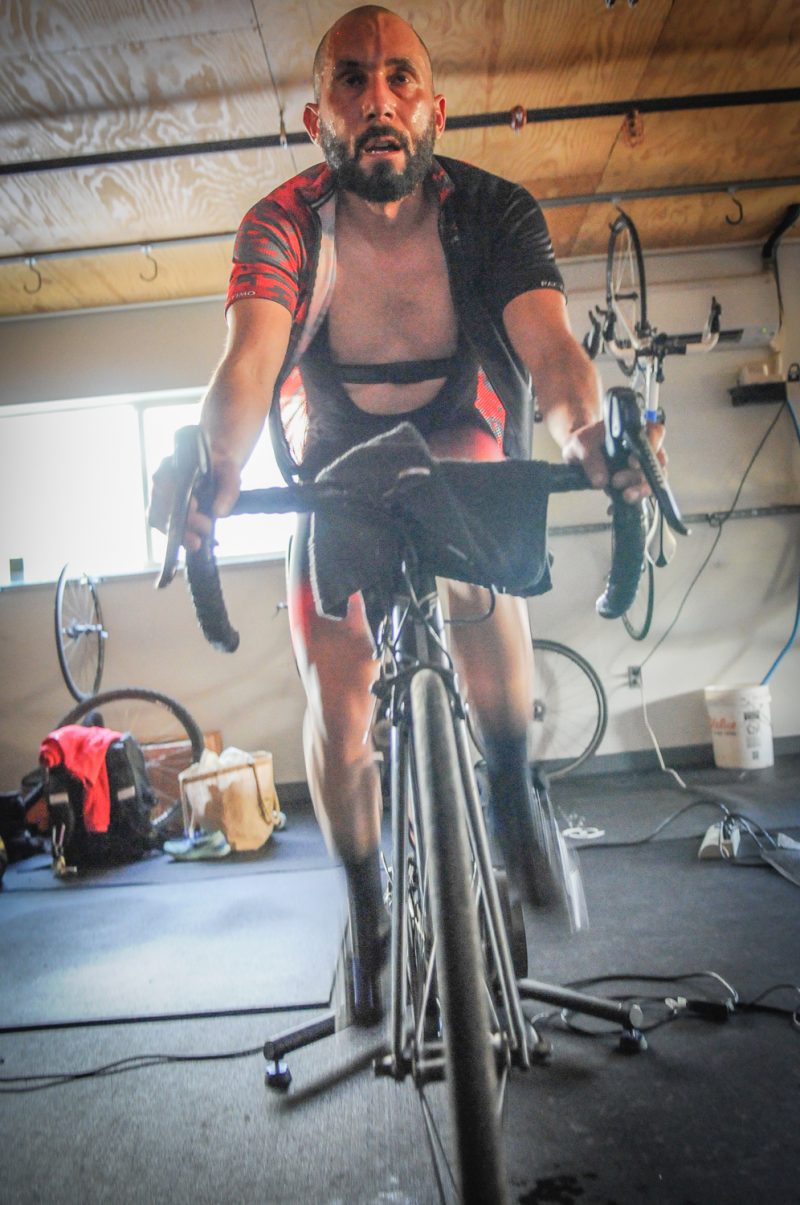

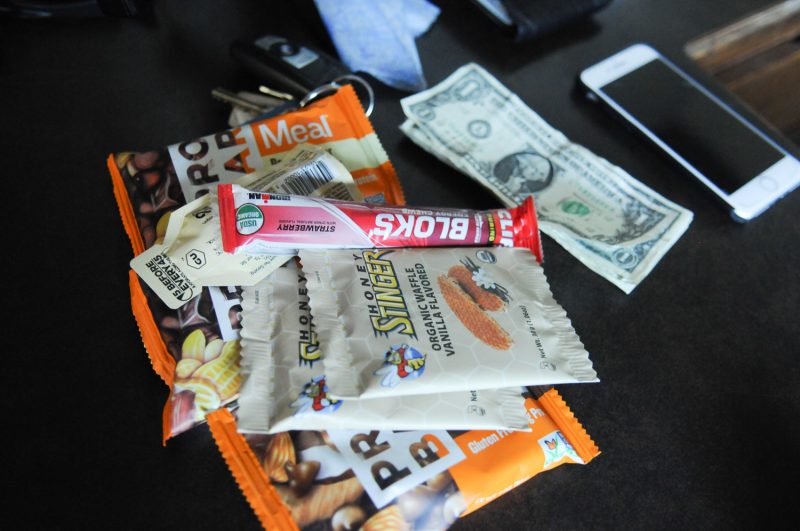

All 15 riders faced the same direction, looking at three huge LCD screens placed at eye-level along one wall. Powerful fans pointed in all directions kept everyone cool and fresh.
Saachi Murthy is a member of the Fast Fun Nice Cycling Team. He got hooked on bike racing after trying cyclocross in 2015. He comes to C-Velo to keep himself accountable. “I can’t manage more than an hour on a trainer by msyelf,” he told me before the race began, “It’s kind of boring.” Like everyone else I spoke to, Murthy also loves riding outside, but finds the controlled indoor environment especially good for all-out efforts — a.k.a. interval training.
And the esprit de corps aspect is paramount. “We suffer together,” is how Murthy put it. “It’s a community.”
One rider I spoke to was recovering from a serious neck injury and, although he rode his heart out Wednesday night, he’s hasn’t been cleared by his doctor to ride outside yet.
As the racing begins in earnest, the lights go out, the room gets darker, and Cady becomes something of a drill sergeant. “Hit it! Come on! Come on!” he barks, as the riders react to the on-screen instructions telling them how hard to push and for how long.
The ground in the upstairs studio rumbled as pressure on the pedals increased. “Push harder!” Cady implored.
At the end of the workout, congratulations and prime prizes were passed around. A goofy group photo of sweaty, smiling athletes was taken, and people crowded around roaring fans to cool off. All the data from the session will be in the riders’ inbox by the time they get home. They’ll look over the numbers, then come back again next week to try and push them a little higher.
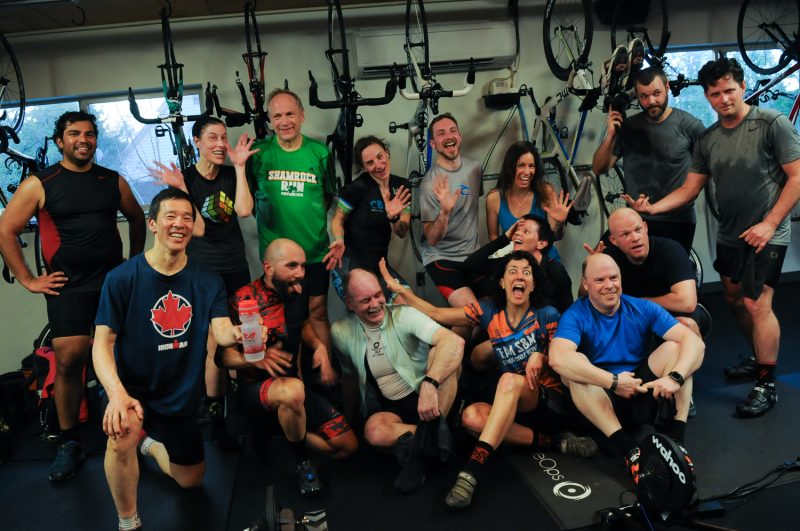
— Jonathan Maus: (503) 706-8804, @jonathan_maus on Twitter and jonathan@bikeportland.org
Never miss a story. Sign-up for the daily BP Headlines email.
BikePortland needs your support.





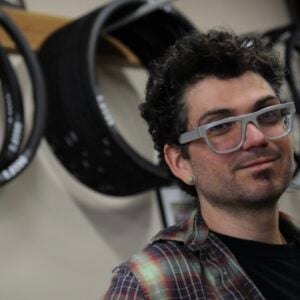

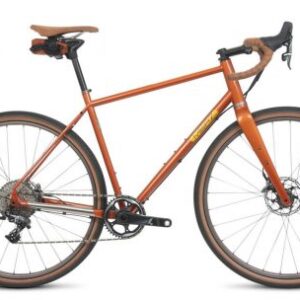
Thanks for reading.
BikePortland has served this community with independent community journalism since 2005. We rely on subscriptions from readers like you to survive. Your financial support is vital in keeping this valuable resource alive and well.
Please subscribe today to strengthen and expand our work.
Awesome! Thanks for posting this 🙂
Thanks for the post! I often see their post-Wednesday sweaty class pics on instagram and wondered what exactly went on at C-Velo. They always look sweaty and thrilled.
I don’t have a smart trainer at home so am interested in trying this sometime…can you provide any details on pricing for the classes or series?
I did a 12 week training session at C-Velo with Chris Bagg Coaching Group this past winter. It ended up being roughly $20ish per class. C-Velo has different prices depending on what you sign up for. I had a great experience there, and I’ll probably return next winter! http://c-velocycling.com/pricing-signup/class-package-pricing/
Thanks for the link and testimonial Emily! I’ll check out the packages.
Meanwhile bike racing, I mean bike racing on the road, is dying a rapid death in Oregon and the U.S. Many people are turning to virtual racing, like Zwift and Strava and numbers for
‘real’ races are plummeting. In Bend alone, the highest profile road and mtb events both folded this year (Cascade Cycling Classic and The Blitz.
Cascade will be back next year. Don’t know about Blitz.
I wouldn’t hold your breath, unless they hire an experienced promoter. It is just too much for a person who runs a business; I was puzzled when Visit Bend partnered with Bart in the first place. Up until a week before the cancellation, they were claiming no way would they cancel. Maybe it is just the blogs that I have read, but I am surprised at the number of locals who are glad it was cancelled; car drivers of course, but you would not have heard that 15 years ago.
Yes road racing is on a downswing… But I think virtual racing/indoor riding aren’t as much of a factor as it might seem. From what I’ve learned and experienced, the indoor revolution could be helping road racing by making training easier. With easier access to training, people can get fit faster and I bet they end up racing/riding outside more, not less in the long run.
IMO the overwhelming things hurting road racing is its cultural problems (elitism, machismo, high cost) and people’s fear about riding on unsafe streets that’s leading to more interest in gravel rides/races and people simply doing other sports.
If we can cure the driving abuse epidemic and make road racing more accessible, road racing might come back! Oh and then there’s the constant doping in the pro peloton and the utter lack of Great American Hopes. That doesn’t help either.
Those are obviously just your opinions, of course. and, as far as I know, you have a very limited exposure to road racing. I administered racing in Oregon back in the day, and watched it grow tremendously in the 80’s and 90’s and early 2000’s, when I retired from the sport. So, I really do not have any real clue about why the sport has declined so much. I doubt the elitism,machismo angles; sounds more like your own personal issue. That, along with drugging, have been around since I started racing in the early 70’s. Cost, yes, has gone up dramatically. It cost $5 to race in the 70’s, maybe $10-$15 when I promoted races in the 80’s and 90’s, and I now see entry fees of $35+, so it has gone up more than inflation, and is definitely a barrier.
Yes. Only my opinions. Here are some more of them …. I’ve been following and/or working in the bike industry since the 1990s when I started road racing on my collegiate team. I’ve seen the road racing culture from many different perspectives — both inside and outside of it. I find that it’s not a very welcoming place for a lot of people and it hasn’t done a good job of finding a new generation to replace the one from the heyday of the 80-90s and the Lance era. It is extremely expensive to participate in — both in terms of the cost of gear, time to train, and entry fees. Road culture is generally also not as fun to newbies as other parts of the scene that have taken a bit out of its participation — first from MTBing, then cyclocross, and now gravel riding/racing. And now the rise of social media and GPS technology allows this new generation to organize themselves and they are not reliant on sanctioning bodies, teams, race promoters, and so on.
I’m just airing some thoughts… I think road racing is primed for a resurgence and we can look at Portland’s racing scene for many signs of hope — including the great energy and people I met at C-Velo. Thanks for the comments steve.
I’ll add an opinion. I ride lots of bikes, but I am not a racer. I’ve got a solid crew of folks that ride together, gravel, road, bikepacking trips, MTB rides. One guy likes to race, the rest of us are too damn cheap to spend the cash and have too man other commitments to effectively get into racing. Cross being the exception – I tried it for the first time last season and fell in love because it is fast, low time commitment and a great workout. Thus the ROF (return on FUN) is high for the effort you need to put in. As a guy that is never going to win, I’d rather just race my friends while we are doing our thing. I don’t need to pay a bunch of money to finish mid pack or worse, I can do that on any of the many free “disorganized” rides that are happening. Or if I wanted to race I’d just do the Sauvie Shootout… I have no answers, we often talk on our car rides to rides about how racing is fading and why…
I honestly don’t see the appeal in stuff like this. Must be a hipster thing.
Community and accountability are SO HIPSTER.
Not as hipster as calling something hipster that doesn’t appeal to you.
I don’t see the appeal in fixies.
What about cut-off jean shorts? Something tells me you’re a big fan.
The higher the better – nothing like a pair of Daisy Dukes and a set of hairy legs.
I’m not surprised by the popularity of this service — I expect most people would find it superior by both a fun and training perspective to riding the numbers even with the aid of virtualization.
I am concerned by the growing sentiment in the cycling community that reduces cycling to the act of pedaling and considers all other factors somehow extraneous. I do not buy the idea that cycling is disappearing because the roads are so hostile. A lot of road riding is not great but the roads have never been easier, the cars have never been safer, and the culture never more accepting of cycling.
As to the declining popularity of road racing, I’d attribute it to the fact that Americans aren’t winning. Road racing gained enormous popularity when LeMond won the TDF, and that went through the roof when Lance did multiple times in fairy tale fashion. And as soon as we aren’t winning, people neither want to watch or play wannabe.
For those who blame doping, baseball and football were also highly doped sports. Thanks partly to strong players unions, the witch hunt mentality causing results from over a decade earlier to be overturned doesn’t happen in those sports.
I’m also not so sure about the cost factor. Bike racing is not cheap under any circumstances, but it absolutely is not necessary to spend crazy amounts on cycling gear because a point of rapidly diminishing returns is reached quickly once you reach a certain level — it’s certainly less than 3 grand and pro deal hookups for discounted gear will be available at some level. Besides, it’s not as if popular sports like golf and auto racing are cheaper.
The elitism is a negative stereotype largely perpetrated within the cycling community itself. Such people exist, but those who put others down typically do from a point of insecurity and typically aren’t that good anyway. I’m a Fred who owns two ‘bents and get some good natured ribbing from hard core roadies, but the attitudes I encounter here on BP more elitist and less friendly than P12’s I’ve rubbed shoulders with. JONATHAN: I’m curious if you’ll let that comment through, but it is meant as an honest expression of my observations and not as an incendiary statement.
I don’t know what can be done about the machismo thing. Road racing is a culture of pain. Being competitive requires being endure a lot of it, crazy amounts of hard work, and the willingness to take risks at high speed.
Good points. The lack of any American racing heroes definitely has hindered the sport. Bike racing is a tough sport; it is painful and can be tough on the ego. Cyclocross has grown because everyone gets ‘dropped’ immediately and rides alone. When that happens in a road race, it is humiliating/frustrating. I’m guessing that millennials are more attracting to a sport like ‘cross, where their ego does not get damaged as much as getting dropped in a road race. They can say ‘it was so much fun just riding in the mud’. All this said a bit tongue in cheap. Still trying to figure out where Jonathan got his skewed vision of the sport.
Road racing and bike racing disappearing? Looked at the OBRA calendar lately? Soon, like in another week or two you…yes you Steve…could race your bike every day and almost every night of the week. Even in Bend on a Wednesday night.
So is this actual racing or just a group workout? Doesn’t sound much different from a, ya know… “spin class”.
It’s different when you can see your stats and chase your threshold FTP (mine is woefully pathetic)
I’ll echo what others have said about C-Velo. I trained with Rick for three months and loved every minute of it. Awesome setting and great group atmosphere. It really helped it develop as a rider and I was better prepared for the next race season. I was noticeably stronger on the bike after those three months.
I did some limited training with Rick about the time I moved to California. It was one of the things I was sorry to leave behind. Yes, indoor racing is great with groups of friends, metrics to challenge yourself (and others), and excellent coaching to improve your techniques. Outdoor road racing was always too much of a commitment for my diverse interests, plus I spent as much time driving to events around the northwest than I did in the saddle.
I highly recommend C-Velo, by the way.
Bruuuuce!!!